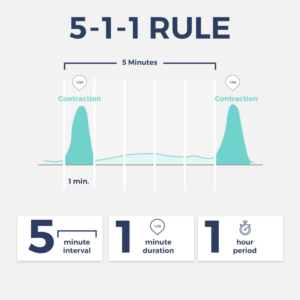Pregnancy can be different for everyone, including the labor and delivery experience. Here are some common misbeliefs about labor and deliver before you experience it!
Once your cervix is dilated and you start contractions – it’s time to GO!
This is not always the case. In some cases, you may be dilated and efface before labor begins – sometimes weeks before. However, other times you’ll start contractions before your dilated. Also, remember that your contractions need to be a certain length and period apart before it’s really “go time.”
Talk to your doctor before heading to the hospital. Be prepared to talk about your contractions, if your water broke, what did it look like and etc. These series of questions will help determine whether or not you should head to the hospital or wait until your body is closer to being ready to deliver.
During COVID-19: Under normal circumstances, you may have gone to the hospital only to be put in triage or sent home if you’re not quite ready to deliver. Nowadays, it’s best and safest to plan ahead. Depending on where you are in your pregnancy, you and your doctor should go over what steps you need to take when it’s “go time.” Don’t be afraid too, to call the hospital you plan on delivering at to ask further questions to have the safest delivery as possible!
Your water will break before labor begins.
As you are probably picking up on, labor and delivery isn’t a set schedule! Many times women will go into labor first and then their water will break — at times, right before the baby is about to be born.
Many women experience what is called Braxton Hicks contractions, or false labor before going into true labor. False labor can be if:
- Contractions don’t happen regularly
- Contractions are weak and don’t get stronger
- Contractions don’t get closer together
- Contractions stop when changing positions, or while you’re moving
- Contraction pains are only felt in the front abdomen (true contractions will usually start from the back and move to the front)
A common rule to figure out if you’re contractions are real is the 5-1-1 rule.
Remember to call your doctor immediately once your water breaks!
Other Myths
Epidurals can only be used in a limited window of time
Actually, depending on what you and your doctor have discussed about your pain management you can usually get an epidural during any time during your labor. Some people are scared to get an epidural because they are afraid it’ll slow down labor or lead to a cesarean section. There’s no credibility or evidence in this myth that it slows down labor or leads to a cesarean section. In fact, c-sections come in to play due to other factors. For example, you may have been in labor for many hours and have tried everything to deliver, but your labor has stalled. This would be a possible time to opt for a c-section.
Pushing Hurts Way More than Contractions
Every woman experiences pain differently when going through labor and delivery! Contractions, though, can feel more painful than pushing because the pushing is much faster and shorter than a contraction. Some women actually feel relief from pushing or don’t feel much pain at all — during delivery your baby can push on your nerves and you’ll feel a bit numb to the pain of pushing. If you’ve never had a contraction before: it involves more than just your vaginal region, but areas around your torso contracting musicals, organs, nerves, and skin as tightly as possible up to a minute at a time every couple of hours. Depending on your pain tolerance and what pain management you decide on, labor and delivery aren’t as bad as you think!
By the way, what does a strong contraction feel like?
According to our Labor and Delivery RN at Christ Hospital, Kathleen Gorman, a strong contraction is “one you can’t talk through.” She says, “you won’t want to talk to anybody and you know!”
At Mt. Auburn our experienced physicians are ready to field your calls or deliver your baby at any hour on any day. If you think you might be going into labor, call us as soon as possible. In the event of an emergency, call 9-1-1. If you’re looking for an OB-GYN, we’d be happy to set up an appointment at any of our 3 locations!

